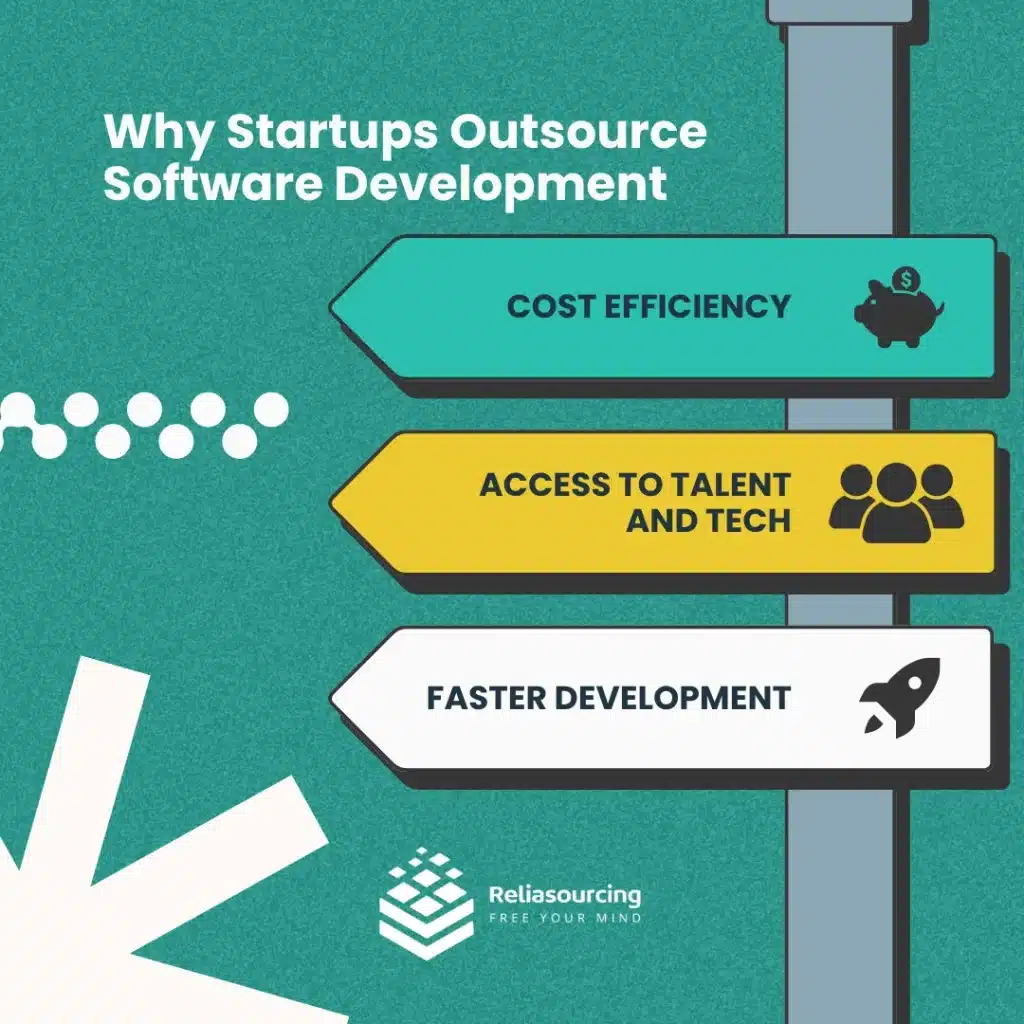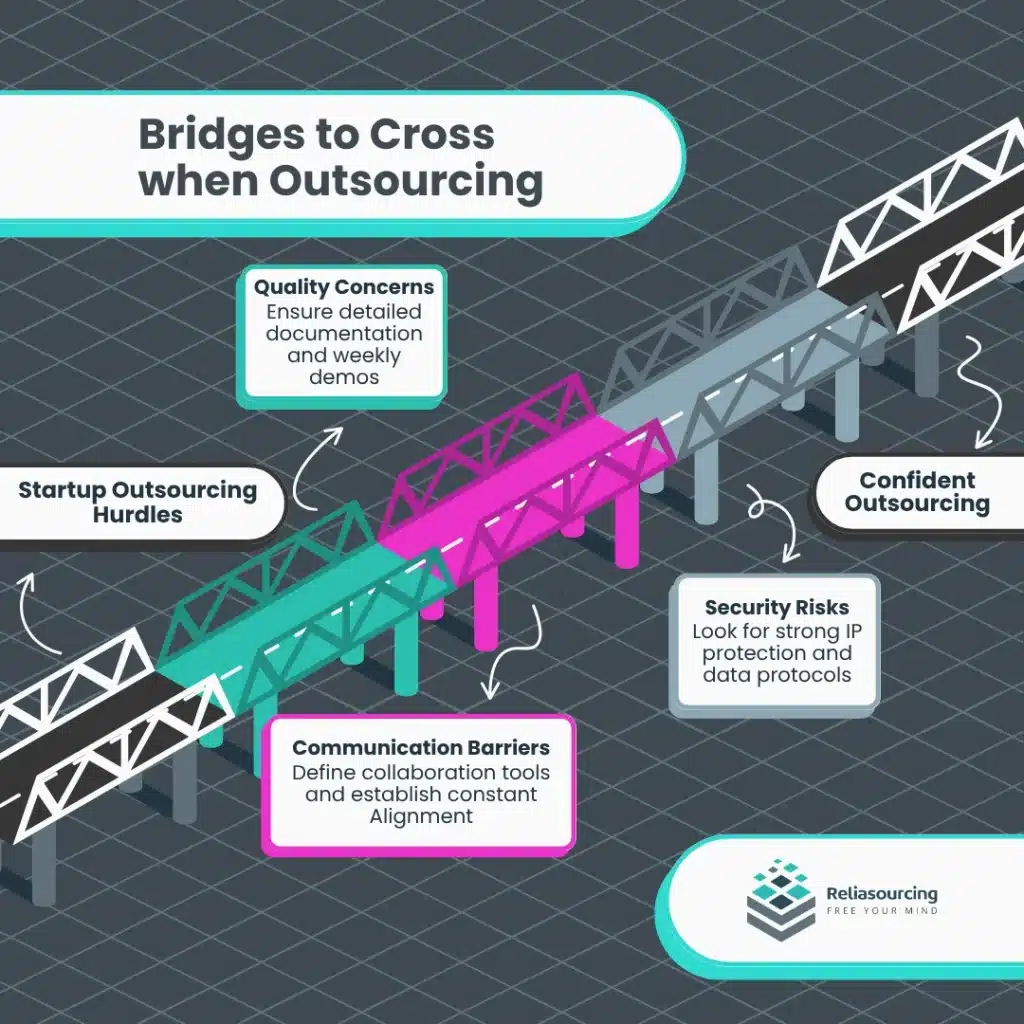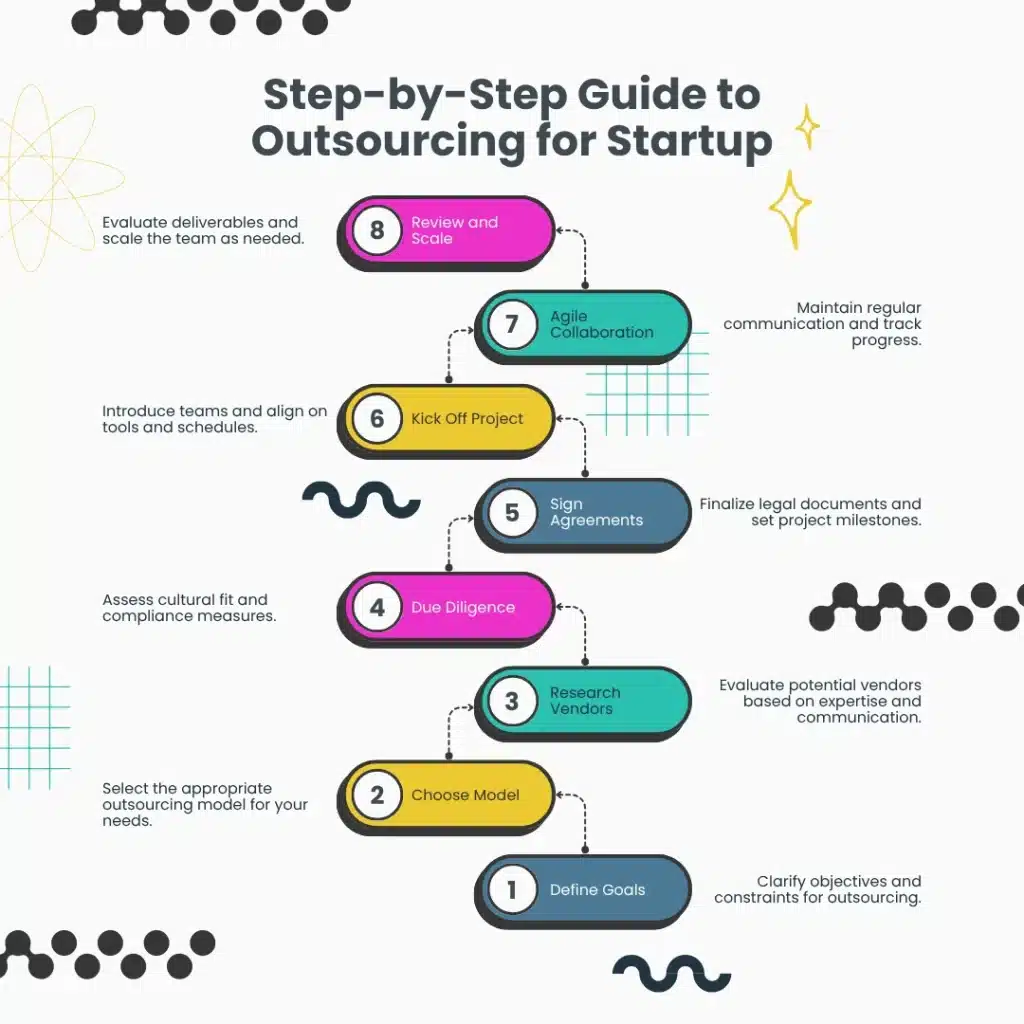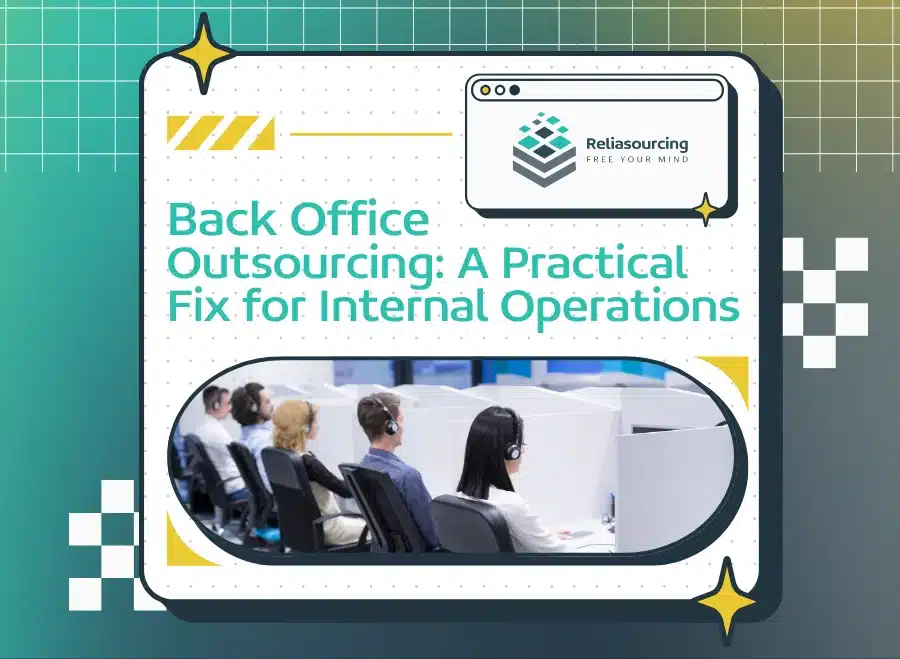Building a software product as a startup is a thrilling but overwhelming endeavor. Time, capital, and tech expertise are always in short supply, while competition never sleeps. In this environment, many startups take a move only once employed by enterprise giants: outsourcing software development.
From lowering costs to accessing global talent pools, outsourcing can be the difference a company needs between launching a scalable product on time or missing the market altogether. For founders and startup executives evaluating whether to go in-house or external, this guide will unpack both the why and the how behind making outsourcing work for your startup.
We understand that startups are not miniature versions of big companies. They operate under radically different constraints and pressures, with most building from scratch, refining business models in real time, and often facing resource limitations that make traditional hiring and team scaling impractical. Outsourcing, when approached strategically, becomes a force multiplier that empowers startups to punch above their weight.
Why Startups Should Outsource Software Development
Startups operate in high-pressure environments defined by speed, agility, and constant iteration. Outsourcing software development gives these lean teams an edge by enabling faster product delivery, access to niche expertise, and better budget control. In turn, this boosts the success of those launching a Minimum Viable Product (MVP) or even those scaling up to meet increased demand.

Cost-Efficiency and Budget Management
For early-stage startups, every dollar counts, and every cent must yield tangible results. Hiring a local team, particularly in high-cost regions like San Francisco, New York, London, or Tel Aviv, can rapidly deplete available capital. The average salary of a mid-level software developer in these regions often exceeds $100,000 annually—New York having $161,396 annually as an average—not including benefits, workspace, or retention incentives. Outsourcing, by contrast, enables startups to cut labor costs by as much as 70% while maintaining quality and output.
More importantly, outsourcing business processes empowers startups to allocate resources more flexibly. Instead of being locked into fixed costs, startups can operate with variable expenses that scale based on the development phase, milestones, and funding rounds. Project-based outsourcing likewise allows startups to access needed expertise without committing to long-term overhead. At the same time, dedicated outsourced teams provide ongoing continuity at a lower cost than an in-house equivalent.
Consider the case of Slack, the collaboration platform that’s now a household name in workplaces worldwide. In its early days, Slack outsourced its app design and development to a Canadian firm called MetaLab. The partnership allowed Slack to stay lean while building a polished, user-friendly interface that stood out in a crowded space. Leveraging MetaLab’s design and development expertise allowed Slack to accelerate time to market and achieve product-market fit faster than if it had built internally from scratch.
Access to Specialized Talent and Cutting-Edge Technology
Startups often operate at the bleeding edge of innovation, meaning they need access to highly specialized skills that are either unavailable or prohibitively expensive locally. Likewise, a company’s technology stack usually dictates the success of a product’s architecture and performance.
In cases like this, outsourcing becomes a viable opportunity for startups to tap into a global ecosystem of developers, designers, and technical experts. These professionals are skilled in modern technologies and have deep experience delivering fast, lean, and iterative startup-grade solutions. QA automation teams can implement testing frameworks that ensure stability at scale, while UX designers versed in conversion psychology can enhance user flow and retention.
Take Alibaba, now one of the largest e-commerce platforms in the world. In its early stages, Alibaba outsourced its website development to a U.S.-based firm. The move gave Alibaba access to a broader technical skill set that wasn’t readily available locally, enabling it to build a robust and scalable platform early on and helping lay the technical foundation for its explosive global growth.
Faster Development Cycles and Scalability
In startup ecosystems, speed equals survival. The faster a startup can validate its assumptions, launch an MVP, and iterate based on user feedback, the greater its chances of carving out market share. In-house teams, constrained by recruitment cycles, internal bottlenecks, and limited bandwidth, often struggle to maintain this pace.
Outsourcing offers a solution through time zone leverage and instant scalability. Distributed teams working across continents are equipped and trained to deliver 24-hour development cycles. While one team closes its laptops in Manila, another team in Eastern Europe picks up the baton, creating a seamless relay of productivity. The round-the-clock rhythm allows for faster sprint completion, quicker bug resolution, and shorter time-to-market.
Let’s take a look at GitHub, which is now the go-to repository platform for developers globally. During its early development, GitHub outsourced its backend infrastructure to a freelance Ruby on Rails developer, enabling GitHub to accelerate the backend development process. At the same time, the founding team focused on user experience and community growth. The outsourcing decision contributed to their rapid development cycles and helped solidify their product in the developer ecosystem.
Key Challenges and How to Overcome Them
There are many reasons why companies outsource work. But while it offers many advantages, it has its fair share of problems. For startups, especially, the stakes are high: missteps in communication, quality, or security can derail an otherwise promising trajectory. In this section, we break down the most common challenges startups face when outsourcing—and how to overcome them confidently and strategically.

Quality Concerns
One of the most common concerns among startup founders is quality control. There’s a lingering perception that outsourced work is subpar. This fear often stems from:
- Lack of visibility into day-to-day progress, especially when working with remote teams across different time zones.
- Misaligned coding standards that make integration difficult or lead to technical debt.
- Unfamiliar quality assurance processes, which may vary significantly from what the startup is accustomed to.
Solution: First and foremost, establish transparent workflows from day one. Require detailed documentation, leverage version control platforms like GitHub, and request weekly sprint demos. Afterwards, encourage bi-weekly or monthly code reviews conducted jointly by internal and external teams. Likewise, quality benchmarks should be implemented in early engagement, and tools like SonarQube or Sentry should be used for performance and error tracking.
At Reliasourcing, we work with agile methodologies, ensuring iterative feedback loops and strong accountability from developers to startup clients. We also maintain a dedicated QA team that oversees code compliance, functionality testing, and user experience.
Communication Barriers
Timezone gaps, cultural nuances, language differences, and communication styles can result in misunderstandings or duplicated effort, since there are still limitations when considering in-house work versus outsourcing it. In agile environments where changes happen fast, miscommunication can be especially costly and frustrating for fast-moving startups trying to maintain velocity.
- Misunderstandings often arise when feedback cycles are delayed or unclear.
- Cultural misalignment can subtly impact communication tone, decision-making speed, and conflict resolution.
- Teams using different platforms (tool sprawl) or not committing to a shared process can create blind spots.
Solution: Choose partners with fluent English communication, assign overlap hours for sync meetings, and define collaboration tools early. To optimize workflow, Asana, Slack, Jira, Notion, and Loom are some standard tools that can create shared visibility and documentation when managing your offshore teams. Moreover, asynchronous updates and recorded walkthroughs should be encouraged when live calls aren’t possible. Also, insist on role clarity. Who owns product decisions? Who triages bugs? Outsourcing works best when everyone knows their lane and follows a clear rhythm of meetings, reporting, and reviews.
Security Risks
Startups often handle sensitive IP, proprietary algorithms, or early customer data. Outsourcing doesn’t absolve you of security responsibilities. On the contrary, engaging third-party vendors introduces additional vectors of risk.
- IP leakage is a real concern, particularly when legal frameworks differ across jurisdictions.
- Poorly secured dev environments or lax access policies can result in breaches.
- Misaligned compliance standards may open up regulatory liabilities.
Solution: Prioritize firms that offer:
- Strong IP protection via NDAs and contracts tailored for international collaborations.
- Data security protocols, which include SOC 2, ISO certifications, GDPR, or CCPA compliance.
- VPN-secured access, use of encrypted repositories, and access restriction by role and geography.
Reliasourcing provides optional managed services that oversee compliance, versioning, and security workflows. We also regularly audit our security practices and help clients build a secure software supply chain from day one.
Best Practices for Successfully Outsourcing Development
To fully unlock the benefits of outsourcing, startups need a strong foundation for collaboration and accountability. The following best practices are a blueprint for building long-lasting, productive relationships with their outsourcing partners while minimizing friction and maximizing impact.
Choosing the Right Outsourcing Partner
Great partnerships start with alignment. When selecting a vendor, startups should prioritize outsourcing partners with demonstrated industry expertise. It’s also essential to assess cultural compatibility, particularly communication styles and workflows, since both teams will collaborate closely.
Startups should factor in the ability to scale up or down quickly, as well as the partner’s track record. And before moving forward, startups are encouraged to request case studies, references, and code samples. Starting with a short-term test project is a practical way to assess compatibility before signing longer-term contracts.
Setting Clear Expectations and Communication Strategies
Misunderstandings can be costly and derail timelines. To avoid this, startups should clearly define the project scope, expected deliverables, and measurable KPIs from the outset. Utilizing visual tools like wireframes and user flows helps eliminate ambiguity.
Equally important is setting expectations around communication, such as the frequency of updates, how sprint planning and demos are handled, and protocols during urgent issues. Well-documented processes foster transparency and keep both sides accountable.
Legal and Security Considerations
Outsourcing across borders introduces legal and security complexities, making it essential for companies to establish robust legal agreements, including master service agreements (MSAs) and statements of work (SOWs) that outline intellectual property ownership, delivery milestones, and termination clauses.
Security should also be a top priority. Startups should ensure their partner complies with data protection standards and offer secure development practices, including VPN usage, encrypted repositories, and adherence to GDPR or other relevant regulations. Choosing an outsourcing partner familiar with international compliance frameworks ensures data protection and continuous innovation.
To help with your outsourcing journey, here’s a step-by-step guide to outsourcing for startups:

How Reliasourcing Helps Startups Outsource Software Development Seamlessly
Reliasourcing offers a startup-first approach that merges scalability, agility, and technical precision, giving any startup company the boost it needs. Unlike firms with rigid workflows, we embrace your dynamic pace given the turbulence when taking the first steps. We know that startups need not just code but clarity, speed, and reliability—traits that define every step of our process. With our focus on tailored solutions, we are committed to becoming an extension of your team.
Industry Specialization
We serve early- and growth-stage companies in:
- Software-as-a-Service (SaaS). Our developers create secure, scalable cloud-native applications with third-party API integration and multi-tenant architecture.
- Gaming and entertainment. We build multiplayer game frameworks, backend streaming services, and live leaderboard systems, focusing on high concurrency and immersive UX.
- E-commerce. Our experience includes headless CMS setups, Shopify customizations, and optimized checkout flows to drive conversions.
- Finance. We develop mobile wallets, secure trading platforms, compliance dashboards, and KYC/AML automation, meeting technical and regulatory standards.
The offshore teams you will have with us will adapt across your product lifecycle, from ideation and prototype to MVP, scaling, and post-launch maintenance, delivering features that build towards business milestones.
In conclusion, our delivery models are designed to be flexible to meet your specific needs. Do you require a long-term embedded team or short-term contributors to enhance delivery speed? We adapt seamlessly to your evolving product and funding cycles, meaning you can scale your team up or down without hassle, eliminating hiring freezes or employee overhead concerns. And as we fulfill your backlogs, expect your company to grow exponentially in areas of development and evolution as well.
FAQ: Common Questions About Outsourcing Software Development
How much does it cost to outsource software development?
The cost to outsource software development depends on the region, the complexity of the project, and the engagement model. Based on estimates from Clutch, outsourcing to the Philippines and Mexico can cost as low as $25-$49/hour, while countries like Poland typically range from $50-$99/hour. Meanwhile, countries like Canada, Australia, and the United States of America sit between $100 – $149/hour. The cost may also vary depending on project scale and the type of technology used.
What are the biggest risks of outsourcing software projects?
The biggest risks of outsourcing software projects include scope creep, miscommunication, and the delivery of unmaintainable code, which can be mitigated through clear documentation and regular milestone reviews. There are many risks to outsourcing teams, but first building transparent relationships with the outsourced team goes a long way.
How do I find the right outsourcing partner?
To find the right outsourcing partner, thoroughly evaluate your prospects’ portfolios, speak with their previous clients, and request code or design samples. Starting with a small pilot task, such as a two-week sprint or feature enhancement, also allows you to gauge quality and compatibility before scaling the engagement.
How do I ensure the quality of outsourced software?
To ensure the quality of outsourced software, development standards must be defined from the beginning, including version control, peer code reviews, CI/CD processes, and comprehensive QA testing. Leveraging tools like GitHub, Cypress, and BrowserStack helps maintain high delivery standards throughout the project lifecycle.
Summary & Final Thoughts
Startups need momentum, but outsourcing software development promises to sustain this drive. In an economy where speed and adaptability often determine survival, outsourcing allows startups to remain focused on their core vision while scaling with flexibility.
The key to success lies in being intentional. Know your needs. Are you trying to validate an MVP quickly or scale a proven product? Choose the right partner, one that understands your domain, shares your pace, and can integrate with your existing workflows. And before the going gets tough, communicate, set expectations, define deliverables, and maintain open feedback loops.
Remember that outsourcing isn’t a compromise or a band-aid solution. With the right partner, it becomes a gateway to innovation, operational efficiency, and accelerated growth. That’s the value Reliasourcing brings. From the first sprint to scaling globally, we help startups build with clarity, speed, and intent, so the tough don’t have to get going.
Let’s build your next big idea together. Contact us today to get started, and see how outsourcing your software development with Reliasourcing can turn your startup dreams into a success story.









